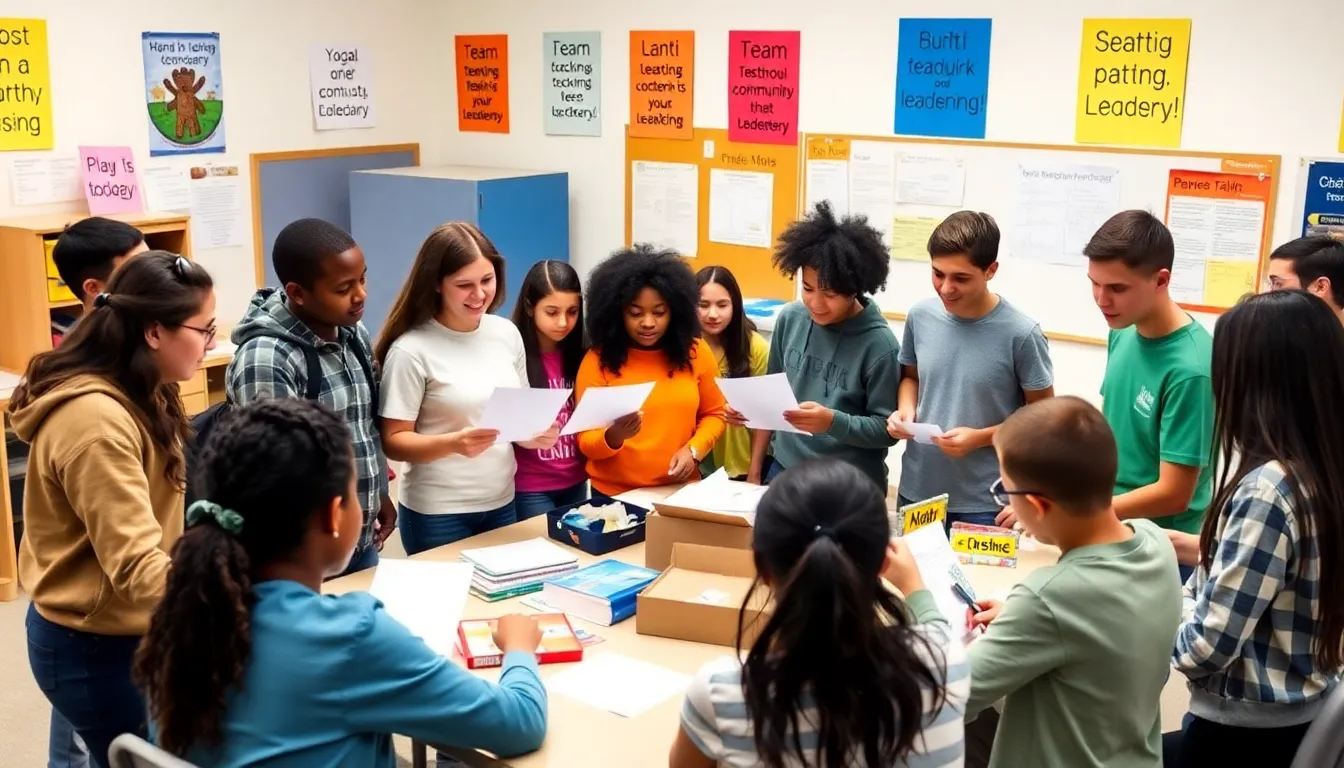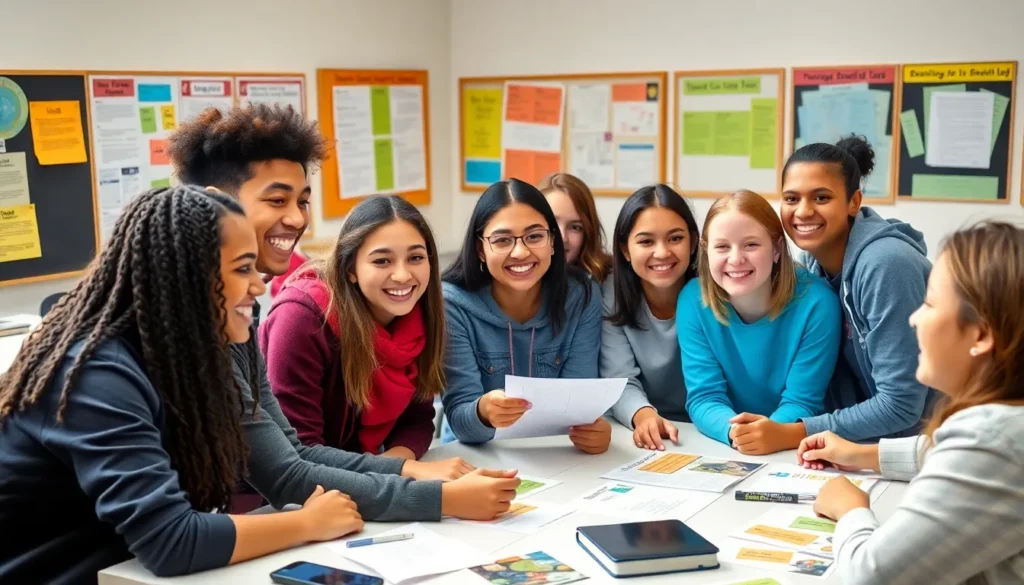Table of Contents
ToggleStudent leadership activities aren’t just a fancy way to fill a resume; they’re the secret sauce that transforms ordinary students into extraordinary leaders. Picture this: a group of young minds brainstorming ideas that could change their school, community, or even the world. Sounds exciting, right? These activities spark creativity, build confidence, and unleash potential that students never knew they had.
Importance Of Student Leadership Activities
Student leadership activities play a critical role in personal and social development. Developing leadership skills early enhances decision-making abilities, fostering responsible future leaders. Participation in these activities promotes teamwork, as students learn to collaborate effectively with peers.
Building confidence occurs naturally through leadership roles. Students frequently face challenges that require problem-solving, pushing them to think creatively and strategically. Engaging in leadership tasks allows students to express and refine their ideas, benefiting their schools and communities.
Exploring various leadership styles and approaches in different activities teaches adaptability. Students often learn how to adjust their methods according to different group dynamics and situations. Opportunities to lead cultivate a sense of responsibility and ownership over projects.
Enhancing communication skills emerges as another key benefit. Students involved in leadership activities practice articulating their thoughts clearly and persuasively, crucial for both academic and professional success. Building relationships with peers, faculty, and community members lays a foundation for networking and future opportunities.
Encouraging civic engagement becomes a natural outcome of student leadership. Through community service projects or school initiatives, students gain insights into social issues, inspiring them to become active participants in their communities.
Overall, engaging in student leadership activities equips students with essential skills and experience, preparing them for successful futures. Investing time in these activities paves the way for personal growth and leadership excellence.
Types Of Student Leadership Activities

Student leadership activities come in various forms, each offering unique opportunities for growth. Engaging in these activities enhances leadership skills and fosters personal development.
Extracurricular Clubs
Extracurricular clubs provide platforms for students to explore interests outside the academic curriculum. Participation in clubs like debate, drama, and robotics cultivates teamwork and problem-solving skills. Additionally, members often take on leadership roles, enabling them to organize events and manage responsibilities. Involvement encourages students to voice their ideas and collaborate with peers, enhancing their communication abilities. Joining a club can spark creativity and motivate students to strive for common goals, leading to a more vibrant school community.
Community Service
Community service activities allow students to give back while developing a sense of responsibility. Involvement in initiatives like food drives, tutoring programs, or environmental clean-ups builds empathy and social awareness. Engaging in these projects challenges students to expand their perspectives while fostering teamwork and collaboration. Students gain invaluable experiences that connect them to their communities and encourage active citizenship. Such participation not only benefits others but also enriches students’ character, preparing them to address societal challenges in the future.
Student Government
Student government serves as a formal avenue for students to express their ideas and influence school policies. Elected positions in student councils empower individuals to represent their peers and advocate for their needs. Holding roles in government teaches valuable skills in negotiation, public speaking, and decision-making. Each member plays a critical part in planning events, resolving conflicts, and fostering school spirit. Through these experiences, students develop a deeper understanding of leadership and the impact of civic engagement.
Benefits Of Participating In Leadership Activities
Participating in leadership activities offers numerous advantages that contribute to holistic student development.
Skill Development
Skill development emerges as a primary benefit of engagement in leadership activities. Students acquire essential skills like teamwork, communication, and problem-solving through various roles. They’ll strengthen their ability to think critically, enhancing decision-making skills vital for both academic and future workplace environments. Activities encourage creativity while providing opportunities to brainstorm innovative solutions to real-world challenges. Participants often gain confidence as they tackle responsibilities, leading projects or initiatives that require strategic planning and execution. Ultimately, these experiences equip students with a diverse skill set that prepares them for success beyond academics.
Networking Opportunities
Networking opportunities play a significant role in student leadership activities. Students connect with peers who share similar interests and goals, fostering friendships that extend beyond the classroom. Through collaboration on projects, they build relationships with mentors, educators, and professionals, opening doors for future opportunities. Participation in events or conferences enhances visibility among influential figures, which can lead to internships or job offers. Engaging with a diverse range of individuals cultivates a broader perspective, enriching their educational experience. This network becomes a vital resource as students navigate their academic journey and future career paths.
How To Get Involved
Getting involved in student leadership activities provides a valuable opportunity for personal growth. Students can choose various paths to make a meaningful impact.
Joining Existing Programs
Many schools offer established programs that support student leadership. Joining an extracurricular club like debate, drama, or robotics allows students to engage with peers who share similar interests. Participation in community service initiatives, such as food drives and environmental clean-ups, also fosters social awareness. Involvement in student government presents a chance to influence school policies directly. Seeking out these programs encourages students to explore their passions while developing essential skills like teamwork and communication.
Starting Your Own Initiative
Starting an initiative can be empowering for students wanting to create change. Identifying a specific need in the school or community often inspires projects that resonate with peers. Gathering a group of like-minded individuals helps build momentum and foster collaboration. Establishing clear goals and responsibilities ensures the initiative stays organized and impactful. Promoting the initiative through social media and school announcements increases visibility and participation. This approach not only empowers students but also enhances their leadership skills, fostering a sense of responsibility and community engagement.
Student leadership activities are vital for shaping the leaders of tomorrow. They provide invaluable experiences that go beyond traditional learning. By participating in these activities, students cultivate essential skills such as teamwork, communication, and problem-solving.
These experiences not only foster personal growth but also instill a sense of civic responsibility. Engaging with peers and the community enhances their understanding of diverse perspectives.
Ultimately, embracing leadership opportunities prepares students for future challenges and empowers them to make a meaningful impact in their schools and communities. The journey of leadership begins with these activities, laying the groundwork for lifelong skills and contributions.




